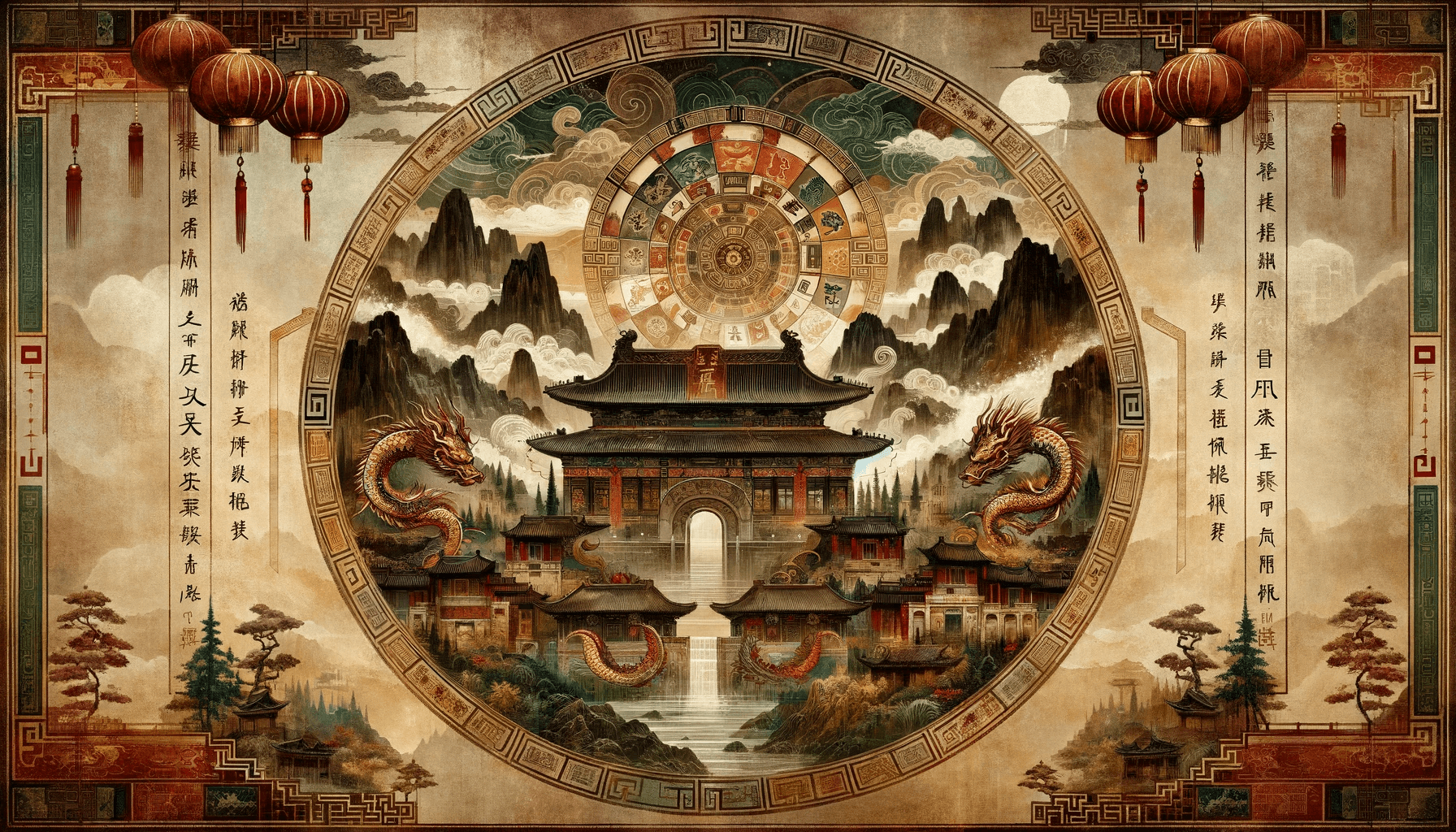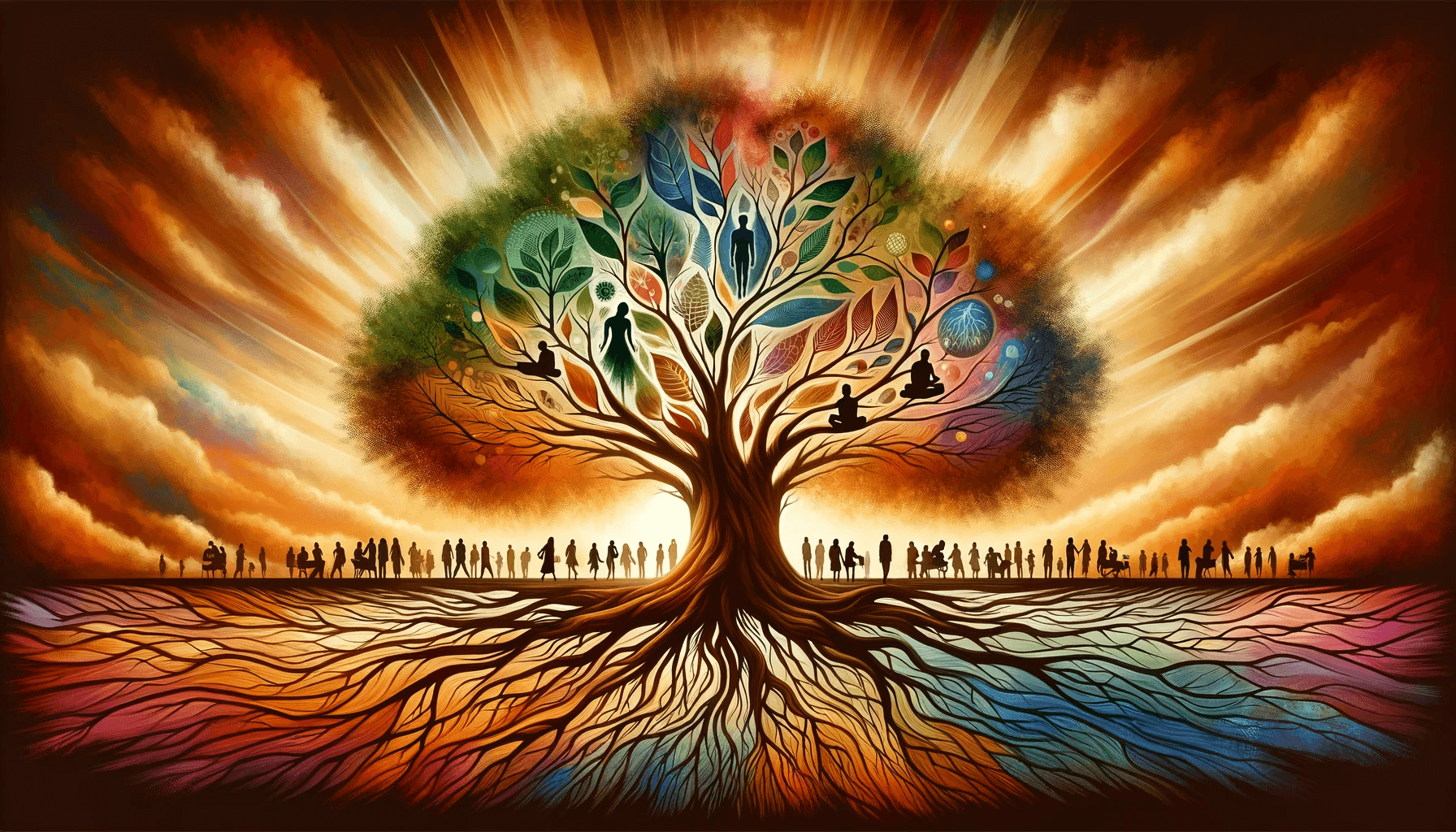Sponsor Cosmic Energy Bracelet
Table of Contents
Introduction to Chinese Astrology
Chinese astrology, also known as Eastern astrology, is a unique and ancient system that has been practiced and revered for thousands of years. It is a profound way of understanding ourselves, our relationships, and the world around us. Unlike Western astrology, which focuses on positioning the stars and planets at the time of birth, Chinese astrology is based on a twelve-year cycle represented by twelve animal signs. Each animal sign has its own unique characteristics and symbolism.
The History and Origins of Chinese Astrology
The roots of Chinese astrology can be traced back to ancient times, dating as far back as the Zhou Dynasty (1046-256 BCE). It is believed to have originated from the observations of the celestial bodies and their impact on human life. The Chinese understood that the universe is interconnected and that the movements of the stars and planets can influence the energies that flow within us and around us. This led to the development of a sophisticated system of astrology that is deeply ingrained in Chinese culture to this day.
The Chinese Zodiac: 12 Animal Signs and Their Meanings
The Chinese Zodiac is an essential component of Chinese astrology and culture, featuring 12 animal signs. Each year in the 12-year lunar cycle is associated with a different animal, and it’s believed that people born in each animal’s year have certain personality traits and fortunes related to that animal.
Rat (鼠 – Shǔ)
- Years: 2020, 2008, 1996, 1984, 1972, 1960…
- Traits: Intelligent, adaptable, quick-witted, charming, artistic, sociable.
- Compatibility: Dragon, Monkey, Ox.
- Inauspicious with: Horse.
Ox (牛 – Niú)
- Years: 2021, 2009, 1997, 1985, 1973, 1961…
- Traits: Loyal, reliable, thorough, strong, reasonable, steady, and determined.
- Compatibility: Rat, Snake, Rooster.
- Inauspicious with: Sheep, Dog, Rabbit.
Tiger (虎 – Hǔ)
- Years: 2022, 2010, 1998, 1986, 1974, 1962…
- Traits: Brave, confident, competitive, unpredictable, self-reliant, charismatic.
- Compatibility: Dragon, Horse, Pig.
- Inauspicious with: Monkey, Snake.
Rabbit (兔 – Tù)
- Years: 2023, 2011, 1999, 1987, 1975, 1963…
- Traits: Gentle, quiet, elegant, alert, quick, skillful, kind, patient.
- Compatibility: Sheep, Dog, Pig.
- Inauspicious with: Rooster, Dragon.
Dragon (龙 – Lóng)
- Years: 2024, 2012, 2000, 1988, 1976, 1964…
- Traits: Lucky, flexible, eccentric, imaginative, artistic, spiritual, charismatic.
- Compatibility: Rooster, Rat, Monkey.
- Inauspicious with: Dog.
Snake (蛇 – Shé)
- Years: 2025, 2013, 2001, 1989, 1977, 1965…
- Traits: Philosophical, organized, intelligent, intuitive, elegant, attentive, decisive.
- Compatibility: Dragon, Rooster.
- Inauspicious with: Pig, Monkey.
Horse (马 – Mǎ)
- Years: 2026, 2014, 2002, 1990, 1978, 1966…
- Traits: Adaptable, loyal, courageous, ambitious, intelligent, adventurous, strong.
- Compatibility: Tiger, Sheep, Rabbit.
- Inauspicious with: Rat, Ox.
Goat (羊 – Yáng)
- Years: 2027, 2015, 2003, 1991, 1979, 1967…
- Traits: Mild-mannered, shy, kind, peace-loving, sympathetic, creative.
- Compatibility: Rabbit, Horse, Pig.
- Inauspicious with: Ox, Dog.
Monkey (猴 – Hóu)
- Years: 2028, 2016, 2004, 1992, 1980, 1968…
- Traits: Fun, energetic, active, influential, intelligent, magnetic, quick-witted.
- Compatibility: Rat, Dragon.
- Inauspicious with: Tiger, Pig.
Rooster (鸡 – Jī)
- Years: 2029, 2017, 2005, 1993, 1981, 1969…
- Traits: Independent, practical, hard-working, observant, analytical, straightforward.
- Compatibility: Ox, Snake.
- Inauspicious with: Rabbit, Dog.
Dog (狗 – Gǒu)
- Years: 2030, 2018, 2006, 1994, 1982, 1970…
- Traits: Loyal, honest, amiable, kind, cautious, prudent.
- Compatibility: Rabbit, Tiger.
- Inauspicious with: Dragon, Ox, Goat.
Pig (猪 – Zhū)
- Years: 2031, 2019, 2007, 1995, 1983, 1971…
- Traits: Generous, sociable, diligent, compassionate, honest, easy-going.
- Compatibility: Tiger, Rabbit, Goat.
- Inauspicious with: Snake, Monkey.
Each of these signs is also associated with one of the five elements (Wood, Fire, Earth, Metal, and Water), which adds another layer to the astrological analysis, influencing each sign’s overall personality and fate. The combination of the Chinese zodiac animal and the element is believed to determine a person’s characteristics and life path.
The Five Elements in Chinese Astrology
In Chinese astrology, the concept of the Five Elements, also known as the Five Phases or Wu Xing (五行), plays a crucial role. These elements are Wood, Fire, Earth, Metal, and Water. Each element is believed to have its own characteristics and is thought to influence people’s personality, behavior, and destiny, especially when combined with the Chinese zodiac animals.
Wood (木 – Mù)
- Characteristics: Growth, expansion, vitality. People influenced by the Wood element are often seen as generous, warm, persuasive, and cooperative. They tend to be stable, patient, and nurturing, like trees growing steadily.
- Zodiac Compatibility: Wood is believed to interact positively with Water (which nurtures Wood) and negatively with Metal (which chops Wood).
Fire (火 – Huǒ)
- Characteristics: Dynamism, strength, persistence. Fire-type personalities are often energetic, passionate, adventurous, and enthusiastic. They are leaders and innovators with a flair for the dramatic and a desire for the spotlight.
- Zodiac Compatibility: Fire is fueled by Wood and is extinguished or melted by Water.
Earth (土 – Tǔ)
- Characteristics: Stability, reliability, practicality. Those influenced by the Earth element are grounded, loyal, and stable. They are often the “rock” in their relationships and communities, providing support and nurturing to those around them.
- Zodiac Compatibility: Earth is nurtured by Fire (which creates ash, or Earth) and can block or use Water.
Metal (金 – Jīn)
- Characteristics: Structure, discipline, rigidity. Metal influences lead to strong-willed, determined individuals who are often ambitious and forceful. They value order and control and can be excellent organizers and leaders.
- Zodiac Compatibility: Metal is created by Earth and is melted by Fire.
Water (水 – Shuǐ)
- Characteristics: Fluidity, adaptability, softness. Water personalities are flexible, diplomatic, and easygoing. Like water, they can adapt to their surroundings while still exerting their influence, shaping their environment quietly but persistently.
- Zodiac Compatibility: Water is nourished by Metal (as in condensation on Metal) and nourishes Wood.
Interactions and Balance
In Chinese philosophy, these elements are not static; they interact with and control each other, creating a dynamic balance. For example, Water controls Fire (extinguishes it), Fire controls Metal (melts it), Metal controls Wood (cuts it), Wood controls Earth (roots hold soil, preventing erosion), and Earth controls Water (channels and contains it).
Integration with Zodiac Signs
The integration of the Five Elements (Wood, Fire, Earth, Metal, Water) with the Chinese Zodiac signs creates a detailed and nuanced astrological system. Each of the 12 animal signs is associated with one of the five elements, and this combination recurs every 60 years. The idea is that a person’s personality and destiny are influenced not only by their zodiac animal but also by the prevailing element of their birth year.
How It Works
- 60-Year Cycle: The Chinese Zodiac operates on a 12-year cycle, with each year represented by a different animal. Combined with the five elements, which change every two years, creating a 60-year cycle. Each animal sign thus appears with each element once every 60 years.
- Elemental Influence: The element associated with a person’s birth year is believed to profoundly influence their personality and life path, in addition to the attributes bestowed by their zodiac animal.
Examples of Integration
Here’s an example of how the elements can influence the characteristics of each zodiac animal:
- Wood Rat: Innovative, sociable, adaptable, but can be over-ambitious.
- Fire Ox: Determined, passionate, reliable, but can be stubborn.
- Earth Tiger: Strong, realistic, and grounded, but can be rigid.
- Metal Rabbit: Elegant, sophisticated, resilient, but can be cautious to a fault.
- Water Dragon: Intuitive, perceptive, and flexible, but can be overly emotional.
Personal and Universal Elements
- Personal Element: The element of your birth year is considered your personal element and is thought to shape your intrinsic traits.
- Universal Element: Each year also has a prevailing element that influences that year’s general environment and mood. This can interact with your personal element in various ways.
Compatibility and Conflict
- Compatibility: Certain animal-element combinations are believed to be more compatible with others. For instance, a Wood Tiger and a Fire Horse might get along well because Wood fuels Fire, leading to harmony and mutual support.
- Conflict: Conversely, some combinations may lead to conflict. For example, a Metal Rat might find it challenging to get along with a Wood Ox, as Metal chops Wood, symbolically representing conflict or dominance.
Integrating elements with the Chinese Zodiac adds complexity to Chinese astrology, offering a more personalized and in-depth understanding of one’s character and destiny. It reflects the traditional Chinese view of a harmonious, interconnected universe.
How Chinese Astrology Differs from Western Astrology
While both are rooted in ancient traditions and focused on predicting one’s destiny and personality traits based on celestial phenomena, Chinese astrology and Western astrology differ significantly in their approaches, systems, and cultural contexts.
Basis of Astrological System
- Chinese Astrology: Based on the lunar calendar, Chinese astrology focuses on a person’s birth year. It incorporates the 12 animal zodiac signs, the five elements (Wood, Fire, Earth, Metal, Water), and the concepts of Yin and Yang.
- Western Astrology: Based on the solar calendar, Western astrology centers on the month of birth. It uses 12 zodiac signs, which are determined by the position of the sun in various constellations at the time of one’s birth.
Zodiac Signs
- Chinese Zodiac Signs: The Chinese zodiac is a 12-year cycle, with each year assigned an animal sign: Rat, Ox, Tiger, Rabbit, Dragon, Snake, Horse, Goat, Monkey, Rooster, Dog, and Pig. These signs are believed to influence personality traits and destiny.
- Western Zodiac Signs: The Western zodiac is a 12-month cycle, with each month associated with a constellation: Aries, Taurus, Gemini, Cancer, Leo, Virgo, Libra, Scorpio, Sagittarius, Capricorn, Aquarius, and Pisces. The signs are thought to affect one’s personality and life based on the position of the stars and planets.
Elements
- Chinese Elements: The five elements in Chinese astrology are Wood, Fire, Earth, Metal, and Water, which interact with the zodiac animals and are thought to influence personality and destiny.
- Western Elements: Western astrology uses four elements: Fire, Earth, Air, and Water. Each sign is associated with one of these elements, influencing personality traits and behaviors.
Planetary Influence
- Chinese Astrology: Does not emphasize the role of planets in determining one’s fate or personality.
- Western Astrology: Heavily focuses on the positions and movements of planets, such as Mercury, Venus, Mars, etc., and how they affect individuals’ lives and personalities.
Philosophical and Cultural Context
- Chinese Astrology: Deeply intertwined with Taoist and Confucian philosophy, emphasizing balance, harmony, and the interconnectedness of all things.
- Western Astrology: Influenced by Greco-Roman mythology and Hellenistic philosophy, focusing more on individualism and psychological aspects.
Approach to Destiny and Personality
- Chinese Astrology: Often focuses on fortune and misfortune, compatibility, and the influence of one’s birth year on their life path.
- Western Astrology: Typically centers on psychological traits, character analysis, and individual potential, influenced by the positions of celestial bodies at the time of birth.
Calendar System
- Chinese Astrology: Uses the lunar calendar for determining zodiac signs.
- Western Astrology: Uses the Gregorian (solar) calendar.
Chinese and Western astrology offer unique lenses through which to view the world and our place in it. While they share some similarities in seeking to understand human behavior and destiny based on celestial phenomena, their methodologies, cultural underpinnings, and interpretative frameworks are distinctively different.
Personalities and Traits of Each Chinese Zodiac Sign
Each sign is believed to impart distinct personality traits and attributes to individuals born in its year. Here’s a brief overview of each sign:
Rat (鼠 – Shǔ)
- Years: 2020, 2008, 1996, 1984, 1972, 1960…
- Traits: Intelligent, adaptable, quick-witted, charming, sociable, and resourceful. Rats are known for their acute observation skills and ability to solve problems.
Ox (牛 – Niú)
- Years: 2021, 2009, 1997, 1985, 1973, 1961…
- Traits: Strong, reliable, fair, conscientious, and methodical. Oxen are seen as hardworking, dependable, and capable of trusting.
Tiger (虎 – Hǔ)
- Years: 2022, 2010, 1998, 1986, 1974, 1962…
- Traits: Brave, competitive, unpredictable, and self-confident. Tigers are natural leaders, known for their courage and willingness to engage in adventure or challenge.
Rabbit (兔 – Tù)
- Years: 2023, 2011, 1999, 1987, 1975, 1963…
- Traits: Gentle, quiet, elegant, and alert. Rabbits are known for their kind, patient, and particularly responsible nature.
Dragon (龙 – Lóng)
- Years: 2024, 2012, 2000, 1988, 1976, 1964…
- Traits: Enthusiastic, courageous, intelligent, and charismatic. Dragons are powerful beings known for their leadership qualities and ability to inspire others.
Snake (蛇 – Shé)
- Years: 2025, 2013, 2001, 1989, 1977, 1965…
- Traits: Wise, mysterious, intuitive, and sympathetic. Snakes are thinkers and philosophers, often introspective and private.
Horse (马 – Mǎ)
- Years: 2026, 2014, 2002, 1990, 1978, 1966…
- Traits: Energetic, independent, impatient, and enjoy traveling. Horses are known for their strong motivation and need for personal freedom.
Goat (羊 – Yáng)
- Years: 2027, 2015, 2003, 1991, 1979, 1967…
- Traits: Mild-mannered, shy, kind, and peace-loving. Goats are creative and resilient, with a strong sense of justice.
Monkey (猴 – Hóu)
- Years: 2028, 2016, 2004, 1992, 1980, 1968…
- Traits: Sharp, smart, curious, and mischievous. Monkeys are clever and resourceful, known for their sense of humor and advanced problem-solving abilities.
Rooster (鸡 – Jī)
- Years: 2029, 2017, 2005, 1993, 1981, 1969…
- Traits: Observant, hardworking, courageous, and talented. Roosters are very straightforward, like to keep busy and enjoy being in the spotlight.
Dog (狗 – Gǒu)
- Years: 2030, 2018, 2006, 1994, 1982, 1970…
- Traits: Loyal, honest, kind, cautious, and prudent. Dogs are known for their loyalty and honesty, they are trustworthy and reliable.
Pig (猪 – Zhū)
- Years: 2031, 2019, 2007, 1995, 1983, 1971…
- Traits: Compassionate, generous, diligent, and easy-going. Pigs are known for their calm nature and strong sense of responsibility.
Each animal in the Chinese Zodiac imparts a unique set of characteristics that are believed to influence the life, personality, and destiny of individuals born under their sign. These traits are further influenced by the Five Elements (Wood, Fire, Earth, Metal, Water) and their interactions within the Chinese astrological system.
Using Chinese Astrology for Compatibility and Relationships
Chinese astrology is often consulted for insights into compatibility and relationships. It’s believed that certain zodiac signs get along better with some than others, and understanding these dynamics can help in personal and professional relationships. Here’s a general guide on how Chinese astrology is used for assessing compatibility:
Understanding Zodiac Compatibility
- Animal Signs: Each of the 12 Chinese zodiac animals has distinct characteristics; some are naturally more compatible with others. For example, the Rat is traditionally seen as compatible with the Dragon and Monkey, but less so with the Horse.
- Elements: The Five Elements (Wood, Fire, Earth, Metal, and Water) also play a significant role in compatibility. Elements that support or create each other are generally more compatible. For instance, Water nourishes Wood, suggesting good compatibility between Water and Wood signs.
- Yin and Yang Balance: The concept of Yin (feminine, passive, receptive) and Yang (masculine, active, assertive) is also important. A balance of Yin and Yang in relationships is considered ideal for harmony.
Specific Compatibility Pairings
- Best Matches:
- Rat with Dragon or Monkey
- Ox with Rooster or Snake
- Tiger with Horse or Dog
- Rabbit with Sheep or Pig
- Dragon with Rat or Monkey
- Snake with Ox or Rooster
- Horse with Tiger or Dog
- Sheep with Rabbit or Pig
- Monkey with Rat or Dragon
- Rooster with Ox or Snake
- Dog with Tiger or Horse
- Pig with Sheep or Rabbit
- Challenging Matches:
- Rat with Horse
- Ox with Sheep
- Tiger with Monkey
- Rabbit with Rooster
- Dragon with Dog
- Snake with Pig
- Horse with Rat
- Sheep with Ox
- Monkey with Tiger
- Rooster with Rabbit
- Dog with Dragon
- Pig with Snake
Using Astrology Wisely
- Guidance, Not Determinism: Chinese astrology can offer insights and guidance, but it’s important to remember that it’s not deterministic. Personalities, life experiences, and individual choices play a significant role in relationships.
- Cultural Context: The principles of Chinese astrology are deeply rooted in Chinese culture and philosophy. Understanding this context can enrich the interpretation of astrological insights.
- Self-Understanding and Empathy: Astrology can be a tool for self-reflection and understanding others, fostering empathy and patience in relationships.
While Chinese astrology can provide interesting perspectives on compatibility, it’s best used as a supplementary tool for understanding and navigating relationships rather than a strict rulebook. Personal interactions, mutual respect, and effective communication are vital to healthy and fulfilling relationships.
Chinese Astrology and Career Choices
Chinese astrology can offer unique perspectives on career choices and professional development. According to this ancient system, each zodiac sign, influenced by its inherent traits and the interplay of the Five Elements (Wood, Fire, Earth, Metal, Water), may be naturally inclined toward certain types of careers. Here’s a brief overview of career suggestions based on Chinese astrology:
Rat: Intelligent, Resourceful
- Ideal Careers: Business, finance, accounting, entrepreneur, writer, politician. Rats are quick-witted and resourceful, making them well-suited for careers that require problem-solving and adaptability.
Ox: Reliable, Hardworking
- Ideal Careers: Engineer, architect, farmer, real estate agent, banker, doctor. Oxen are known for their diligence and reliability, thriving in professions requiring meticulousness and strength.
Tiger: Brave, Competitive
- Ideal Careers: CEO, military officer, entrepreneur, pilot, travel writer, athlete. Tigers are natural leaders and adventurers suited for challenging careers and allow them to be in charge.
Rabbit: Gentle, Artistic
- Ideal Careers: Teacher, diplomat, lawyer, writer, designer, curator. Rabbits excel in environments that are peaceful and organized, and they have a knack for artistic pursuits.
Dragon: Confident, Charismatic
- Ideal Careers: CEO, entrepreneur, artist, priest, athlete. Dragons are ambitious and driven, often finding success in careers that allow them to express their creativity and leadership.
Snake: Wise, Philosophical
- Ideal Careers: Philosopher, writer, psychiatrist, fortune-teller, scientist. Snakes are deep thinkers, well-suited for careers that involve contemplation and strategy.
Horse: Energetic, Independent
- Ideal Careers: Travel agent, journalist, language instructor, performer, pilot. Horses thrive in careers that offer freedom and excitement.
Goat: Creative, Peaceful
- Ideal Careers: Artist, actor, gardener, musician, teacher. Goats are creative and prefer a calm and comfortable environment, making artistic fields a good fit.
Monkey: Clever, Innovative
- Ideal Careers: Engineer, scientist, banker, air traffic controller, film director. Monkeys are quick learners and problem solvers, suited for dynamic and challenging careers.
Rooster: Observant, Hardworking
- Ideal Careers: Journalist, public relations officer, soldier, accountant, dancer. Roosters are precise and detail-oriented, excelling in careers where thoroughness and consistency are essential.
Dog: Loyal, Honest
- Ideal Careers: Lawyer, judge, teacher, counselor, healthcare worker. Dogs are loyal and honest, well-suited for careers that involve helping others and advocating for justice.
Pig: Generous, Diligent
- Ideal Careers: Chef, entertainer, veterinarian, interior designer, healthcare worker. Pigs are compassionate and have a strong sense of responsibility, doing well in nurturing and creative roles.
Using Chinese Astrology for Career Guidance
- Self-Reflection: Chinese astrology can be a tool for self-reflection, helping individuals understand their inherent strengths and tendencies.
- Broad Perspectives: It provides broad suggestions rather than specific job titles, encouraging individuals to consider various suitable options.
- Combination with Personal Interests: One’s career choice should align with personal interests and practical considerations, not just astrological suggestions.
While Chinese astrology can offer interesting insights into potential career paths, it’s important to use this information as a guiding tool rather than a deterministic blueprint. Personal interests, skills, and life circumstances are crucial in shaping one’s professional journey.
Chinese Astrology and Health
Each Chinese zodiac sign is believed to be prone to certain health issues based on its inherent characteristics:
- Rat: Prone to stress and anxiety; balance work and rest.
- Ox: May suffer from neck and shoulder tension; should focus on regular exercise.
- Tiger: Vulnerable to exhaustion; needs to manage their adventurous spirit with adequate rest.
- Rabbit: Prone to allergies; should maintain a calm and stable environment.
- Dragon: Risk of stress-related conditions; should practice relaxation techniques.
- Snake: May experience nervous system disturbances; benefits from a balanced diet and regular exercise.
- Horse: Vulnerable to accidents; should take precautions in physical activities.
- Goat: Prone to digestive issues; needs a balanced diet and regular schedule.
- Monkey: Risk of heart and circulatory problems; should maintain an active lifestyle.
- Rooster: Prone to respiratory issues; should focus on lung health and clean air.
- Dog: Risk of bone and joint issues; benefits from regular, moderate exercise.
- Pig: Prone to weight and digestive issues; should focus on a healthy diet and regular exercise.
Five Elements and Health
The Five Elements (Wood, Fire, Earth, Metal, and Water) also play a significant role in influencing health:
- Wood: Liver and gallbladder issues; should manage stress and anger.
- Fire: Heart and small intestine issues; needs to balance excitement and relaxation.
- Earth: Stomach and spleen issues; should maintain a balanced diet and worry less.
- Metal: Lung and large intestine issues; must breathe clean air and maintain emotional balance.
- Water: Kidney and bladder issues; should manage fear and ensure adequate hydration.
Yin and Yang Balance
Maintaining a balance of Yin (cool, passive) and Yang (warm, active) energies is crucial for good health. Imbalances can lead to various health issues depending on which energy is dominant or deficient.
While Chinese astrology offers a fascinating perspective on health and wellness, it’s important to remember that it should complement, not replace, modern medical advice and practices. It can be used as a tool for self-awareness and preventive health measures but always in conjunction with professional healthcare guidance.
Interpreting Chinese Astrology Charts
Chinese astrology charts, also known as BaZi or Four Pillars of Destiny, comprehensively analyze an individual’s personality, destiny, and life path. These charts are based on the date and time of birth and the year, month, day, and hour. By interpreting the elements and animal signs present in the chart, a trained astrologer can provide valuable insights into various aspects of a person’s life, including career, relationships, and health.
Interpreting Chinese astrology charts is a complex process involving a deep understanding of the Chinese zodiac, the Five Elements, and various astrological principles unique to this ancient system. Here’s an essential guide to help you understand how to interpret a Chinese astrology chart:
Determine the Zodiac Sign and Element
- Zodiac Sign: Identify the person’s Chinese zodiac animal sign based on their birth year. Each animal has specific characteristics that are believed to influence a person’s personality and destiny.
- Element: Each zodiac sign is associated with one of the Five Elements (Wood, Fire, Earth, Metal, Water) for each specific year. This element adds another layer to the personality traits and life path.
Analyze the Zodiac Sign
- Personality Traits: Consider the general traits of the zodiac sign and how they might manifest in the individual’s personality.
- Strengths and Weaknesses: Reflect on the strengths and weaknesses typically associated with the sign.
- Compatibility: Assess compatibility with other zodiac signs, particularly in relationships and social interactions.
Consider the Element
- Elemental Traits: Each element imparts different qualities. For example, a Wood Rabbit might be more adaptable and creative than a Metal Rabbit.
- Elemental Cycle: Understand the generating and controlling cycles of the elements. For instance, Water generates Wood, indicating growth and development in certain life aspects.
Yin and Yang Balance
- Yin and Yang Aspects: Each zodiac sign and element is associated with either Yin (feminine, passive) or Yang (masculine, active) energy. Assessing the balance of these energies can provide insight into personality and behavior.
Look at the Life Cycle
- 12-Year Cycles: Consider the person’s age and current position in the 12-year zodiac cycle. Each cycle can bring different challenges and opportunities.
Examine Relationships and Compatibility
- Interpersonal Dynamics: Use the zodiac signs to explore potential dynamics in family, romantic, and professional relationships.
Consider the Current Year’s Zodiac Sign and Element
- Annual Influence: Each year is governed by a specific animal and element, which can influence the events and experiences of the individual during that year.
Holistic View
- Overall Picture: Combine all these aspects for a holistic view. Chinese astrology is not just about individual components but how they interact and influence each other.
Cultural and Historical Context
- Understanding Chinese astrology’s cultural and historical background can enrich the interpretation and make it more meaningful.
It is important to note that Chinese astrology charts are highly personalized and require expertise to accurately interpret.
Popular Chinese Astrology Myths and Misconceptions
Chinese astrology, rich in history and cultural significance, is often surrounded by various myths and misconceptions. Understanding these can provide a clearer picture of what Chinese astrology is and isn’t. Here are some popular myths and misconceptions:
It’s All About the Zodiac Animals
- Misconception: Chinese astrology is solely about the 12 zodiac animals.
- Reality: While the zodiac animals are a significant component, Chinese astrology also incorporates the Five Elements, Yin and Yang balance, and other complex factors like the lunar calendar.
Deterministic Predictions
- Misconception: Chinese astrology can predict specific future events and outcomes.
- Reality: Chinese astrology provides general guidance and insight into personality traits and life tendencies, not definitive predictions.
A Yearly Zodiac Sign is the Only Influence
- Misconception: A person’s personality and fate are determined only by their birth year.
- Reality: In Chinese astrology, the month, day, and hour of birth are significant and contribute to a more detailed astrological profile.
Animal Signs Dictate Compatibility
- Misconception: Compatibility between individuals can be determined solely by their zodiac animals.
- Reality: Relationship dynamics in Chinese astrology are more complex, involving the interplay of the zodiac animals, elements, and Yin and Yang balance.
Astrology Equals Superstition
- Misconception: Chinese astrology is just superstition without any practical value.
- Reality: While it’s not a science, Chinese astrology is a rich cultural tradition that offers a unique perspective on personality, behavior, and life cycles. It’s more about personal reflection and understanding than factual predictions.
It’s the Same as Western Astrology
- Misconception: Chinese and Western astrology are essentially the same.
- Reality: Though both systems seek to understand human behavior through celestial phenomena, they fundamentally differ in their approach, symbolism, and cultural contexts.
Fixed and Unchangeable Traits
- Misconception: The traits associated with each zodiac sign are fixed and unchangeable.
- Reality: Chinese astrology suggests tendencies, not absolutes. Individual personality and life choices play a significant role.
Simple and Easy to Interpret
- Misconception: Interpreting a Chinese astrological chart is simple.
- Reality: Chinese astrology is a complex system that requires deep understanding and interpretation, often by knowledgeable practitioners.
Strictly Traditional and Unchanging
- Misconception: Chinese astrology has remained unchanged over the centuries.
- Reality: While rooted in tradition, interpretations and practices have evolved, influenced by cultural and societal changes.
Understanding these myths and misconceptions can lead to a more nuanced appreciation of Chinese astrology. It’s a symbolic system deeply embedded in Chinese culture, offering insight and guidance rather than concrete predictions or deterministic views of personality and fate.
Incorporating Chinese Astrology into Daily Life
Chinese astrology is not just a tool for self-discovery but also a way of life. By incorporating the principles of Chinese astrology into our daily lives, we can align ourselves with the natural rhythms of the universe and make more informed decisions. This can involve paying attention to auspicious dates and times for important events, using feng shui principles to create harmonious living spaces, and practicing self-reflection and self-improvement based on the insights gained from our astrological profile.
Conclusion
Chinese astrology offers a wealth of wisdom and insights that can enrich our lives and help us navigate the complexities of modern living. By understanding our own unique qualities and those of others, we can forge stronger relationships, make better career choices, and maintain our physical and emotional well-being. Whether it’s through exploring our own birth chart, seeking guidance from a trained astrologer, or simply incorporating the principles of Chinese astrology into our daily lives, we can tap into the ancient wisdom of this profound system and unlock its transformative power.
CTA: Embrace the wisdom of Chinese astrology and unlock its transformative power in your life. Consult with a trained astrologer or explore your own birth chart to gain valuable insights into your personality, relationships, and life path. Incorporate the principles of Chinese astrology into your daily life and experience the profound impact it can have.





Leave a Reply